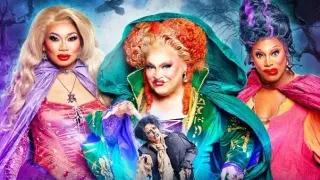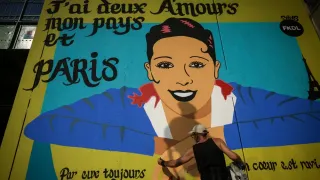October 10, 2015
Pray the Gay Away :: An In-Depth Look at 'Conversion Therapy'
Christiana Lilly READ TIME: 9 MIN.
Just three days after Christmas in 2014, Leelah Alcorn wrote a final message on her Tumblr account -- a suicide note.
"Either I live the rest of my life as a lonely man who wishes he were a woman or I live my life as a lonelier woman who hates herself. There's no winning. There's no way out," she wrote. "People say 'it gets better' but that isn't true in my case. It gets worse. Each day I get worse."
The 17-year-old transgender girl saved the post in her queue, ready to be posted later. She then walked out into the middle of I-71 in Ohio and waited for the truck that would hit her, killing her.
Leelah's story shocked the country, and people began reading her blog, a diary of her Christian parents sending her to conversion therapy sessions to cure her of her confusion.
"I only got more [C]hristians telling me that I was selfish and wrong and that I should look to God for help," she wrote.
OUTRAGE
The controversial practice of conversion therapy, reparative therapy, or ex-gay ministries varies, but generally consists of licensed therapists or houses of worship using religion and "science" for claims they can cure one of their homosexual desires or gender confusion. This can take on the form of praying, talk therapy, exorcism, electrocution, and abuse and are conducted in churches, therapists' offices, or camps.
With Leelah's death, groups cried out for a law that would ban conversion therapy on minors - currently, California, New Jersey and the District of Columbia have outlawed the practice on minors, and 18 other states have legislation that has been introduced, including Florida.
President Barack Obama and Vice Admiral Vivek H. Murthy, the surgeon general of the U.S. and a medical doctor, are two of many high-ranking leaders who have come out in support of "Leelah's Law." Obama said he would sign a bill into law, but it would have to come from Congress.
"Being gay is not a disorder. Being transgender is not a malady that requires a cure. Had I been Leelah Alcorn's physician, I would have told her exactly that," Dr. Murthy said.
Conversion therapy is nothing new - when simply threatening the wrath of God on people was no longer working, churches took a new approach, said Wayne Besen, the founder of Truth Wins Out (TWO), an LGBT advocacy group working to eliminate anti-gay bias.
"Conversion therapy is the hijacking of medical language to justify religious persecution and beliefs," said Wayne Besen, the founder and executive director TWO. "The ministries use the medical language and the therapists use the religious language. It's the same damn thing."
TWO made waves in 2011 when it took down Bachmann and Associates for practicing reparative therapy even though its founder, Marcus Bachmann, the husband of former presidential candidate Michele Bachmann, claimed they did no such thing. TWO conducted an undercover investigation into the practice for a week with cameras. During the investigation, a TWO staffer went through reparative therapy and was promised that he could be turned straight and that they had done it before.
The report came out in the midst of Michele's run for president.
"It takes the most beautiful part of one's life and turns it into something ugly, and when you do that, you're destroying the person spiritually and emotionally and physically," Besen said. "When you turn it into something painful, you destroy the very essence of the person."
Most major medical associations have come out in opposition to the practice, including the American Academy of Pediatrics, American Counseling Association, American Psychiatric Association, and the American Medical Association.
To combat the ongoing practice, the National Center for Lesbian Rights launched the #BornPerfect campaign in 2014 with the goal to eliminate conversion therapy by 2019. One of its most outspoken activists is Samuel Brinton. You can't miss the 27-year-old, with his bright red Mohawk and his signature high heels. He is also a clean energy fellow at Third Way, a centrist think tank in Washington, D.C., where he works on advanced nuclear policy and spends almost every other week in the White House.
But his charisma and smiles were hard to come by just a decade ago.
TORTURE AND PROMISES
The son of Baptist missionaries, Brinton grew up around the globe spreading the word of God and was close with his family. They all told each other everything, including when he came out to his parents by accident at 10. Some boys living in the religious commune located in Sanford, Fla. found a Playboy magazine and were ogling over the photos of naked women.
Brinton was proud of himself, because he said he felt nothing, believing that meant he was holier than his friends. He told his father about the incident, and after they prayed together, he admitted he had those lustful feelings when he was around one of his friends - Dale.
The next thing Brinton remembers, he woke up in the commune's emergency room - his father had knocked him out cold. The beatings continued for the next two months whenever he talked about his feelings towards boys, but he never understood why. Finally, seeing that the beatings weren't working, his parents took him to see a therapist who promised he could cure him of his homosexual thoughts.
"The therapist told me that I was sick, that God hated me, and that the government had exterminated all other gay people," he remembers. "I believed him."
For the next two years, the therapist put the youngster through a series of torturous practices that would get him to associate homosexuality with pain.
He tied Brinton's hands together and numbed them with ice, wrapped his wrists in hot coils, stuck needles in his fingers, and electrocuted him while showing him erotic pictures. He screamed out in pain while his parents were in the next room.
The experience was so traumatic that Brinton asked the Mirror to watch videos of his speaking engagements where he describes his experience, rather than retelling the story again.
After two years, Brinton attempted suicide multiple times and one day, told his sister good-bye and went onto the roof of their apartment. His mother came out, telling him if he "would just change, I'll love you again."
At that moment, Brinton came up with the plan that the best way to make it all stop was to lie. He said it worked and that he was cured - the therapy immediately stopped and the family never spoke of it again. He went back into the closet and stayed there until college.
"I learned to lie and through that survived," he said.
Not all conversion therapy includes physical abuse, but it can be just as damaging. Apryl Prentiss, 37, lives in Virginia Beach with her wife and works as the deputy director for LGBTQ issues at the Alliance for Progressive Values. She too grew up in a Christian home, attended a Christian school, was a part of the church leadership, went on mission trips, and seemed to be the poster child for the faith.
However, she was holding a secret inside her that finally bubbled to the surface when she attended Campbell University, a Christian college: she was a lesbian.
"I had the full realization of, 'Oh my God, I might be gay,' " Prentiss remembers. "It was definitely a dark time and a huge part of the dark time was knowing that if I started talking about it or asked for help that I would risk alienating people who meant a lot to me."
At 19, she took a chance and went to a therapist she was referred to, and for a year she religiously attended sessions filled with prayer and talk therapy with the goal to rid her of her "rebellion," as they called it. Together, the therapist and her dug deep into her history - did she have an issue with her mother? Father? Was there abuse in her childhood? She was also told if she prayed hard enough, it would go away.
But it wasn't working. Prentiss spent hours praying, reading the Bible, fasting, staying away from certain women, and during sessions they would analyze every interaction she had, even something as innocent as having lunch with a female friend. Prentiss started to drink, do drugs, and act promiscuously for a temporary reprieve from the turmoil going on in her mind, that she was disobeying God. In one semester, she developed alcohol poisoning four times.
"Literally you have two sides of yourself screaming in your head all the time," she said. "[Therapy] makes it so introspective, that it's almost like it weaponizes that sexually against you."
After a year of therapy, Prentiss's therapist made an alarming observation in her.
"She was telling me in the midst of the session that she could see a demon moving behind my eyes," Prentiss remembered. "I was scared and I trusted her implicitly."
The solution was to conduct an exorcism on Prentiss, and for three to four hours they tried to excise the demon causing her homosexuality. An hour into it, however, she knew it was not working and the wrong thing to do.
"I can walk away from the exorcism and say, 'That was so weird and the most ridiculous thing ever,' " Prentiss said. "But when I think back it's mostly the talk therapy stuff that's really the most damaging... it gets in your head and it cultivates that self hatred."
After the exorcism session, Prentiss took a break from therapy and started a relationship with a woman. However, she was still suffering from the residual trauma from the therapy and was still confused about her attraction to women - and how happy she felt being in a relationship - when it went against everything she knew from church. So, she ended it and went back to conversion therapy for six more months. In her mid-20s, she went to ex-gay ministries for a few years to "help" others in her situation.
Many in ex-gay ministries treat homosexuality as one would a drug or alcohol addiction, something that needs to be overcome and is a lifelong battle. One marries someone of the opposite sex to lead a normal life, or they become celibate.
"I was still trying to fight really hard against being gay," she said. "It really was like a 12-step program for gays, they called it sexual brokenness."
HEALING AND MOVING ON
It was two incidences that changed her life, leading Prentiss to embrace her sexuality and find love in a woman who would become her wife in 2007. While on a mission trip to Serbia, she said she had "an awakening or an experience of enlightenment," where she reexamined the Bible and what she had been taught all her life. Finally, while working with a 17-year-old girl in ex-gay ministries, she thought about the life she was telling this girl she had to lead: one with a man or a celibate one.
"I remember thinking to myself, this girl is 17 years old," she said. "How can these be the only two options for her life?"
For Brinton, peace in his sexuality finally happened when he attended college at Kansas State University and befriended a lesbian couple in college. The women encouraged him to be himself and helped him find happiness. Today, he is an out and proud gay man who jokes that he came out in a "shower of glitter," with his flamboyant outfits and shoes.
Now, he has a new relationship with God that includes his true self. However, the trauma of the torture he underwent is long-lasting - seconds after his first gay kiss, he vomited. He says it's still physically painful when he touches a man, whether it's a friendly hug or a loving embrace from a boyfriend. It was only last year that he was able to return to a mental health setting, sitting on a couch across from a therapist without a breakdown.
Part of the healing is working for change - he is the co-chair of the NCLR's #BornPerfect campaign and has spoken before the United Nations Security Council about his experience with conversion therapy in November 2014, urging the council to end the torturous practice.
"I can't fathom it," he said during a Google Talk presentation. "We would never allow this to happen to prisoners, and yet we do it to our own children."
In a 2014 interview with Anderson Cooper, Texas Rep. Bryan Hughes said that the Republican Party includes the practice in its platform as a form of religious freedom, especially for those who want to pursue the therapy, but it is not being pushed on anyone.
Besen and TWO not only want conversion therapy to be banned, but point out that it's also a form of consumer fraud: a person takes an ailing person's money, promising results that can never be attained. The agency hopes that this will hit therapists on two levels, the threat of abuse charges as well as business malpractice.
Currently, the Southern Poverty Law Center is keeping track of therapists across that country who use conversion therapy and also encourages survivors to share their story.
The NCLR's goal to ban conversion therapy is going faster than expected, with more people talking about the practice, and President Obama himself condemning it.
"I was simply in awe," Brinton said of the announcement. "We have the most powerful man in the world saying that, yes Sam, you're right, what happened to you was wrong and I don't want it to happen to anyone else. That is the definition of support, of agreement."
Today, Prentiss still lives in Virginia Beach happily with her wife. The two knew each other growing up and were married in 2007, and then legally in Virginia when the state lifted its ban on gay marriage. She said she misses the community of church, but she's not sure if she can return to the Christian faith.
"I will have the trauma reactions every now and then, but in general, I'm happy to be a fully integrated person," she said. "I do feel like my hardest time was when I was in the midst of [therapy], and I was lucky to escape with my life."
For more information on conversion therapy, visit the National Center for Lesbian Rights at NCLRights.org. If you are suffering from the after effects of conversion therapy, visit the Trevor Project atTheTrevorProject.org

 Copyright South Florida Gay News. For more articles, visit
Copyright South Florida Gay News. For more articles, visit 





